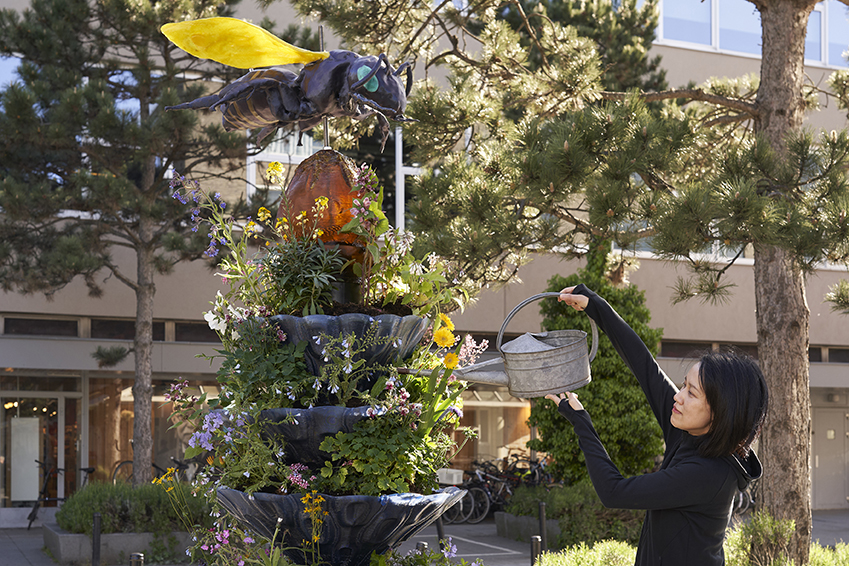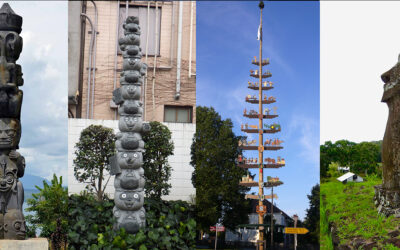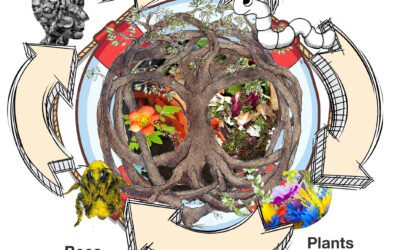Extinction Prevention: The urgent need to transform Urban Landscape into Temporary Sanctuaries
Surprisingly, scientific research suggests that bees actually find more favourable living conditions in urban areas than in rural areas. This realisation has led to remarkable discoveries and innovative case studies over the past decade. Here, we aim to provide insights into what it takes to implement effective citywide pilot projects, overseen and monitored by professionals. Here, the fundamental importance of solid community relationships plays a prominent role in promoting a healthy and sustainable urban environment.
Decline of Wild Bees: A Global Concern
A wide variety of pollinators and especially wild bees are essential for biodiversity. However they are in a worrying decline across Europe and globally. We have been taking action and paved the way forward to transform urban areas into sanctuaries, led by Delft University’s Urban Ecology Lab. Research has revealed that bees thrive surprisingly well in cities, sparking innovative studies.
A Startling Decline in Insect Populations
With the Hallmann report, a nearly three-decade-long study have unveiled a shocking decline of over 75% in flying insect populations, impacting both vulnerable species and the entire flying insect community. What’s astonishing is that this research was conducted in 65 protected natural areas, not in agricultural zones or near highways.
Impact of the Agro-Industrial Complex on Biodiversity
The biodiversity crisis has been exacerbated by the prevalence of monoculture farming, habitat destruction, and the buildup of pesticides in water systems via soil contamination over the past six decades. The influence wielded by the agro-industrial complex on rural landscapes is so substantial that reversing this detrimental trend proves to be an arduous challenge. Even if political reforms were implemented tomorrow, it would require a minimum of two decades before ground and surface waters return to a state safe for insect consumption.
The race against time to save pollinators
Despite extensive awareness campaigns, national and international petitions, and successful referenda to protect biodiversity and save the bees by restricting pesticides, these efforts over the last decennia have made little to no progress. This harsh reality underlines the urgent need to confront the pollination crisis head-on.
Wild Bees: Biodiversity’s Unsung Heroes
While there is much talk about species extinction and biodiversity loss, it is important to understand that wild bees play a central role in maintaining biodiversity. In contrast to the relatively limited variety and pollination function of honeybee species, there are an astonishing number of about 20,000 different wild bee species worldwide. In the city of Amsterdam alone, a remarkable 104 unique wild bee species can be encountered. Over the last 120 million years, each of these wild bee species has co-evolved with a specific range of plants and flowers, developing intricate symbiotic relationships.
Challenges in Current Urban Bee Conservation Efforts
In recent times, policymakers have increasingly recognised that wild bees, rather than honey bees, play a pivotal role in preserving biodiversity. Many European cities are actively seeking to improve pollinator-friendly environments through initiatives such as bee gardens, bee-friendly balconies, and nature-integrated architectural measures such as green roofs. However, addressing the needs of different wild bee species is a complex challenge, and these efforts often take a one-size-fits-all approach and therefore offer only superficial solutions. It is imperative to recognise that each bee species has unique survival strategies. In addition, these species often have a limited geographic range, which underscores the importance of providing associated nesting sites nearby.
A Different Path Forward
A different approach is possible. We need to refocus and set goals with short, medium, and long-term strategies. Here, we provide a brief overview for you to explore the issues we’re tackling:
Empowering Local Communities for sustainable Urban Nature: Replace commercial landscapers and garden centres with an approach that links local people with nature. These businesses often prioritise quick profits over long-term sustainability. Instead, adopt a social-ecological approach to turn urban areas into pollinator-friendly nature reserves.
Enhancing Cooperation: Insufficient cooperation remains a significant hurdle. To overcome this, we’re working to establish local, national and international networks of specialists and organising local think-tanks where experts and institutions can start to collaborate.
Multidisciplinary Solutions: Traditional scientific approaches sometimes contribute to these problems. Our solution is to embrace a multidisciplinary approach that combines art and science, fostering innovative solutions to physically creating urban biotopes.
Education and Awareness: Despite growing environmental awareness, ignorance remains a hurdle. There’s a crucial need for public education. We aim to provide educational and entertaining content (infotainment) to bridge this knowledge gap.
Building Social Bonds: The absence of strong social bonds among individuals is a significant challenge. Many people live isolated lives. To address this, we introduce the concept of totemism, which can bring communities together.
‘Let everyone sweep in front of his own door, and the whole world will be clean.’ J. W. v. Goethe
We at the TUDelft Urban Ecology and Ecocities Lab realise that it is most important to arrange ones own front door, before looking at the neighbours. By visualising an Eco Campus, we embarked on a truly ambitious venture to change local paradigms. By exposing people to interdisciplinary concepts and practices, by encouraging cross-pollination between various areas, including science, design, art, and social science with which to foster interdisciplinary collaboration and physical implementation.
Does this information resonate with you and are you ready to join us in the collaborative efforts, through workshops, symposia or joining think-tanks on this journey? Get in touch!
Image: Ernst van Deursen



